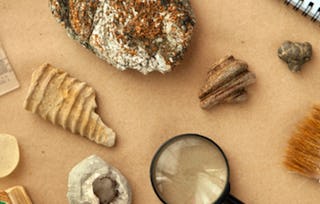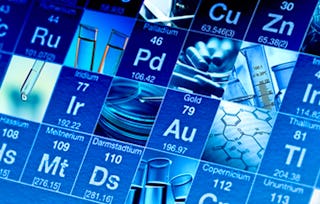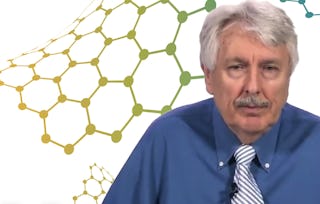Materials are the physical foundations for the development of science and technology. The human civilizations are historically designated by the evolution of materials, such as the Stone Age, the Bronze Age and the Iron Age. Nowadays, materials science and technology support most of the industrial sectors, including aerospace, telecommunications, transportation, architecture, infrastructure and so on. Fundamentals of Materials Science is a core module for undergraduates majored in materials science and engineering. This English course will be taught by Prof. Guo Qiang, Prof. Reddy and Prof. Liu Jing from Shanghai Jiao Tong University. An integrated approach of combining metallic, ceramic and polymeric materials will be adopted in this course, for the attendants to attain a deep understanding on the correlation of composition, microstructure, processing and properties in materials science. Let’s gather in this course and explore the wonderland of materials together.

Ends soon: Gain next-level skills with Coursera Plus for $199 (regularly $399). Save now.

(198 reviews)
Recommended experience
Skills you'll gain
Details to know

Add to your LinkedIn profile
16 assignments
See how employees at top companies are mastering in-demand skills

There are 16 modules in this course
In week 1, you will get a brief introduction to materials science, as well as part 1 of module 1 including atomic bonding in solids, crystal lattices, and crystal structures of metals.
What's included
5 videos1 assignment1 discussion prompt
In week 2, we will continue with part 2 of module 1 including crystallographic points, directions & planes, the crystal structure of ceramics, polymorphism & allotropy, the structure of polymers, and round up with the characterization of crystal structures.
What's included
5 videos1 assignment
In week 3, we will start with part 1 of module 2 including the equilibrium concentration of point defects, point defects in ionic solids, the concept of dislocations, and their geometry.
What's included
4 videos1 assignment
In week 4, we will finish module 2 including dislocations in real crystals, their motion, elastic properties, forces, and finally surfaces & interfaces.
What's included
5 videos1 assignment
In week 5, we will start with part 1 of module 3 including stress-strain curves, elastic & viscoelastic properties, slip mechanism, and twinning & kinking.
What's included
4 videos1 assignment
In week 6, we will continue with part 2 of module 3 including grain refinement, solid solution strengthening, second phase & work hardening, and property evolution.
What's included
4 videos1 assignment
In week 7, we will finish module 3 including all about the mechanical properties of ceramics, polymers, and composites.
What's included
5 videos1 assignment
In week 8, we will introduce you in module 4 to the concepts of the kinetics of recovery and recrystallization, grain growth after recrystallization, and finally dynamic recovery and dynamic recrystallization.
What's included
4 videos1 assignment
In week 9, we will introduce you to part 1 of module 5 including the diffusion phenomena, Fick's law, solutions to diffusion functions, and Kirkendall & Darken.
What's included
4 videos1 assignment
In week 10, we will finish module 5 including the thermodynamics of diffusion, atomic mechanisms of diffusion, and factors that affect diffusion.
What's included
4 videos1 assignment
In week 11, we will introduce part 1 of module 6 including the basics and thermodynamics of phase diagrams, as well as the effect of pressure on free energy, and free energy of binary systems.
What's included
4 videos1 assignment
In week 12, we will continue with part 2 of module 6 including the graphic construction of phase diagrams, Gibbs phase rule. and the evolution of different phase diagrams.
What's included
4 videos1 assignment
In week 13, we will continue with part 3 of module 6 including the spinodal decomposition, the lever rule, binary phase diagrams, and we will talk about the differences of steels and cast irons with the iron-carbon phase diagram.
What's included
4 videos1 assignment
In week 14, we will finish module 6 including the continue of our talk about the differences of steels and cast irons with the iron-carbon phase diagram, and we will talk about ternary phase diagrams.
What's included
4 videos1 assignment
In week 15, we will introduce part 1 of module 7 including the basics of phase transformations and solidification, nucleation, heterogeneous vs homogenous nucleation, and the temperature time transformation.
What's included
4 videos1 assignment
In week 16, we will finish module 6 introducting phase transformations in steels and alloy steels, precipitation, and precipitation in Al alloys.
What's included
5 videos1 assignment
Instructors



Offered by
Explore more from Physics and Astronomy
 Status: Free Trial
Status: Free TrialArizona State University
 Status: Preview
Status: PreviewGeorgia Institute of Technology
 Status: Free Trial
Status: Free TrialArizona State University
 Status: Preview
Status: PreviewGeorgia Institute of Technology
Why people choose Coursera for their career




Learner reviews
198 reviews
- 5 stars
73.73%
- 4 stars
21.21%
- 3 stars
1.51%
- 2 stars
1.51%
- 1 star
2.02%
Showing 3 of 198
Reviewed on Sep 5, 2025
The last teacher's speech wasn't clear, so I had to read the captions to understand.
Reviewed on Jul 11, 2021
I am very grateful to learn by international great teachers, Everything goes smoothly . Great course with basic to advance and clear all doubt. Thanks
Reviewed on May 21, 2023
This course was very effective. It would be more beneficial if financial aid is available
Frequently asked questions
To access the course materials, assignments and to earn a Certificate, you will need to purchase the Certificate experience when you enroll in a course. You can try a Free Trial instead, or apply for Financial Aid. The course may offer 'Full Course, No Certificate' instead. This option lets you see all course materials, submit required assessments, and get a final grade. This also means that you will not be able to purchase a Certificate experience.
When you purchase a Certificate you get access to all course materials, including graded assignments. Upon completing the course, your electronic Certificate will be added to your Accomplishments page - from there, you can print your Certificate or add it to your LinkedIn profile.
Yes. In select learning programs, you can apply for financial aid or a scholarship if you can’t afford the enrollment fee. If fin aid or scholarship is available for your learning program selection, you’ll find a link to apply on the description page.
More questions
Financial aid available,





